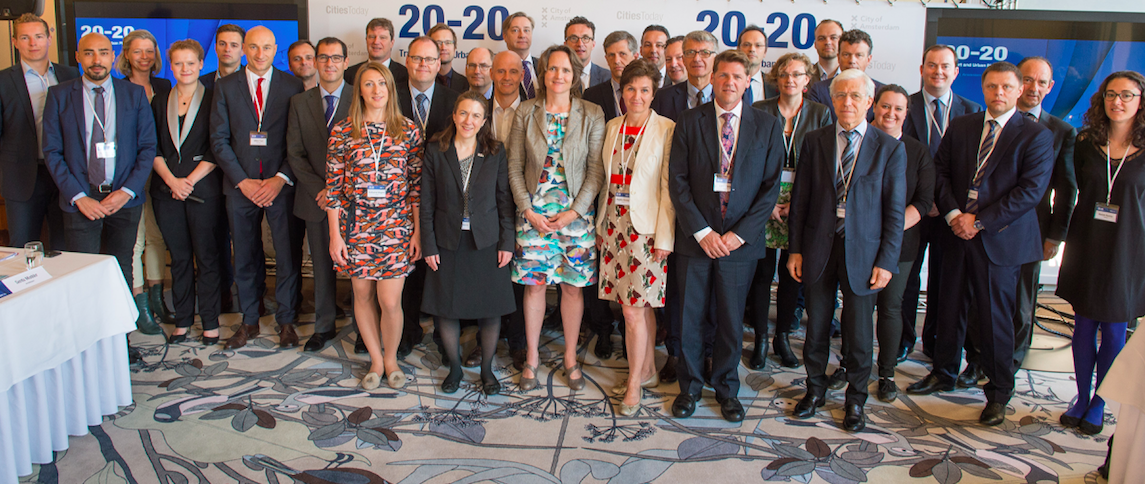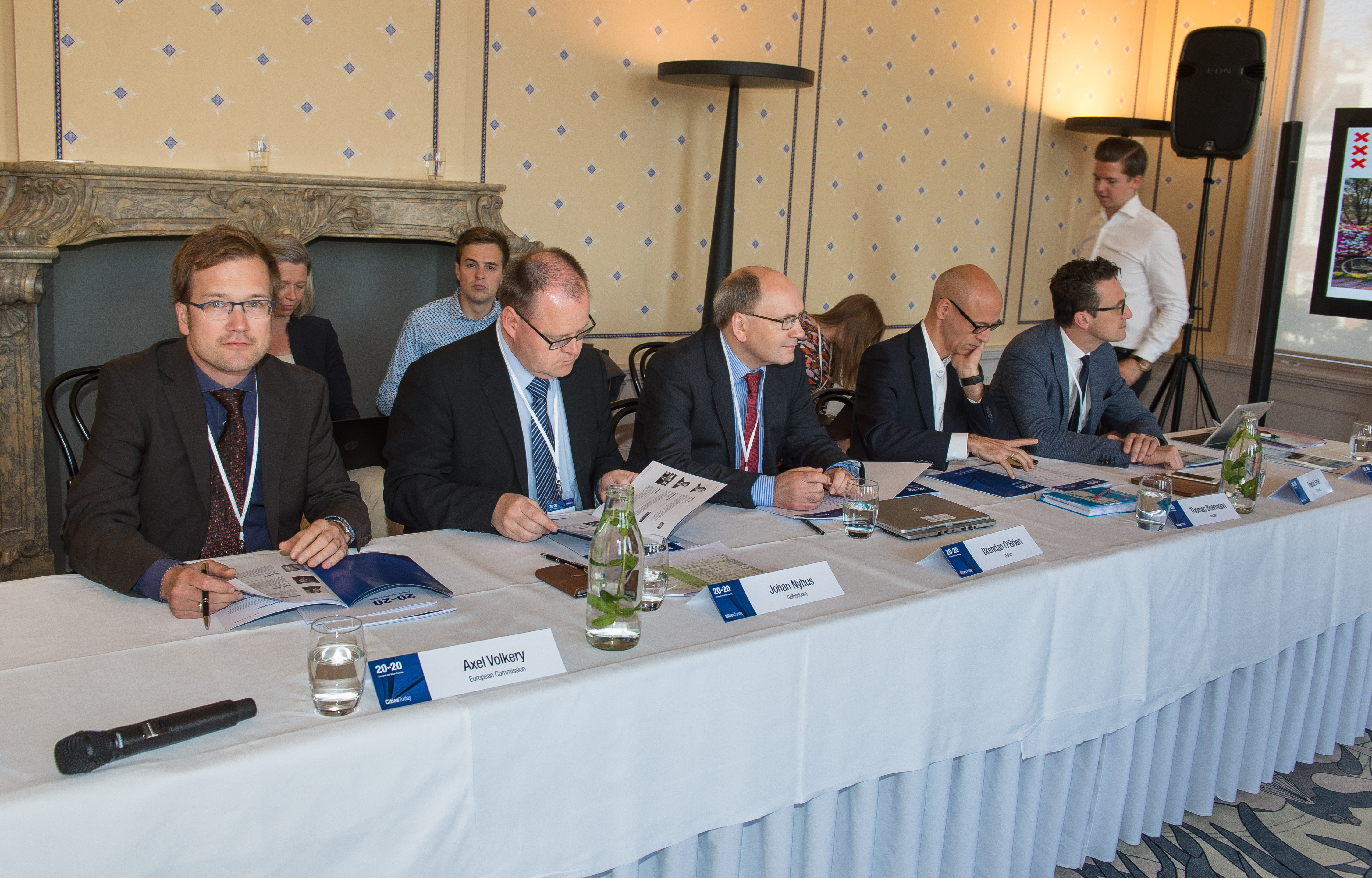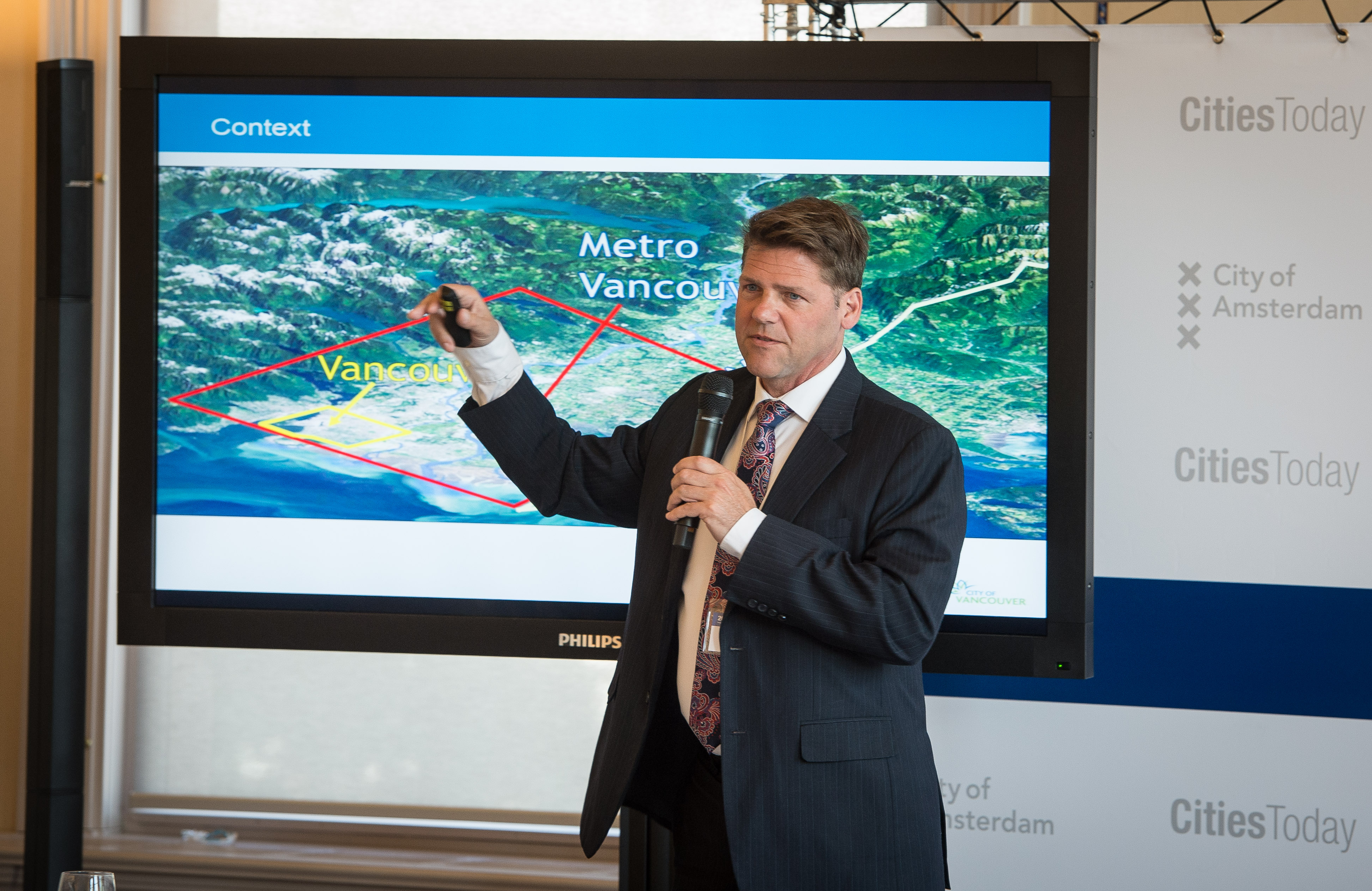
Photo: Screen-Shot-2016-05-17-at-17.43.22
Five talking points from the Transport 20-20 meeting in Amsterdam
17 May 2016
by Steve Hoare
- It’s only a matter of time before autonomous vehicles take over
There was almost complete consensus in the room regarding the issue of self-driving vehicles during the latest meeting of the 20-20 club, which took place in Amsterdam.
Autonomous vehicles are coming. They will be safer. They will lead to less congestion and fewer emissions. And eventually all cars and buses in city centres will be electric driverless vehicles.
Anne-Claire Frank, an adviser to the City of Amsterdam, explained that her city is keen to be a living lab for autonomous vehicles. She is working with the city’s hief technology office and the department of mobility and public space on an impact study to analyse the potential impact of self-driving vehicles on the city.
While some delegates predicted the end of taxi driving as a profession within 10 years, other delegates were not so convinced.
“It does not matter whether it is electric vehicles or driverless cars because we think cars are not the best solution for cities,” said Angelika Winkler, Head of Mobility Strategies in the City of Vienna.
While self-driving cars could be a fantastic tool for ferrying around children, handicapped or elderly people, she does not think they are a panacea.
“There could be a massive shift towards car ownership because people are lazy. And that’s not what we want,” added Winkler.
- Caring means sharing…
Thomas Beermann, Managing Director of car2go Europe, was more gung ho on the subject. His company provides car sharing in cities in North America, Europe and Asia.
“It will replace car sharing and we will evolve with it,” he predicted of autonomous vehicles. For now though, he is more excited about semi-autonomous vehicles that could pick you up automatically and then drive to a charging point after they have dropped you off.
“We could do the same amount of business as we do now but with 35 to 40 percent less vehicles,” said Beermann.
That is the future. Right now, the company is rolling out electric vehicle fleets in Amsterdam and Madrid but it cannot do it everywhere. The car-sharing company is launching a fleet of normal, fuel-guzzling cars in one of China’s biggest metro areas, Chongqing, which does not have the public charging infrastructure to support an EV fleet.
The company is happy to invest–even in cities where operational costs are high–in the belief that most cities will demand zero-emission cars in five to ten years.
Beermann was cheerfully supported by his biggest client Lon LaClaire, Director of Transportation for Vancouver, which hosts car2go’s largest fleet.
The number of shared cars was increased from 1,200 vehicles to 2,600 during the last year and the number of adults signed up to the scheme has increased from 14 percent to 26 percent in two years. However, only 1 percent of trips are taken using car share vehicles in Vancouver.

Axel Volkery (European Commission), Johan Nyhus (Gothenburg), Brendan O’Brien (Dublin), Thomas Beermann (car2go), Pascal Smets (Brussels)
- Funding issues raise passions
If car2go is still in its infancy, there are larger social forces aiding its development.
“The financial crisis has had a big impact on people’s attitudes towards sharing,” said Beermann, accentuating the positives of the austerity age. But money is clearly a cause of concern for most delegates.
Axel Volkery, Policy Officer at the European Commission’s Directorate-General Mobility and Transport, outlined various sources of funds available for transport projects.
He said that competition for Horizon 2020 projects is growing. Dublin is one such beneficiary. The city’s head of technical services Brendan O’Brien told the room how his team had completed Project Insight, which had taken data from disparate sources and standardised it, and was building on that progress with a new Horizon 2020 project entitled Project VaVeL.
Volkery went on to talk about the €14 billion European Structural and Investment Funds, which are normally utilised by member states but are increasingly available to cities, which now account for 5 percent of its largesse.
Volkery revealed that the EIB Elena fund, which was previously only available for projects that were directly connected to energy efficiency, are now being made available for transport projects. Elena is a programme that enables applicants to recover up to 90 per cent of technical assistance costs. This might cover consultancy fees or in-house recruitment to cover certain skill sets.
He also pointed delegates in the direction of the European Fund for Strategic Investments and the of the €21 billion made available for “large-scale projects”. For all those struggling with the plethora of EC funding options, Volkery made a heartfelt request for delegates to “please make use of the EC Advisory Hub”.
Brussels’ ebullient Minister of Mobility, Pascal Smet was left a little nonplussed and issued his own appeal to Volkery’s bosses at the EC to bin the “strict rules” and “ideological reasoning” that prevent public authorities investing in transport projects.
“I think many people in the European Commission see your point but we have to remember fiscal stability,” responded Volkery. Although he conceded: “We need to improve the conditions for front-loaded big investments without putting pre-conditions on the debt.”
“Obviously, we cannot lend if you cannot borrow,” chipped in session moderator Tanguy Desrousseaux, Head of Transport and Transaction Support at the European Investment Bank.

Lon LaClaire, Director of Transportation, Vancouver
- And if you can’t borrow, can you raise taxes?
Last year, the city of Vancouver held a referendum asking citizens whether they could stomach a 0.5 percent increase on sales tax to fund the city’s CA$7.5 billion (US$5.7 billion) transit plan. They couldn’t.
The federal government has offered to fund 50 percent of the city’s 10-year investment plan for its transport infrastructure, rather than its usual third. This has left the city’s mayors weighing up the relative merits of a series of alternative funding sources to fill the gap.
The mayors of Vancouver’s 21 regions have to decide in the coming weeks whether to increase the carbon tax, the fuel tax, the property tax or the regional development charge.
The public reaction to an increase in property tax would likely be very bad at a time when more and more buildings are going up to house a swelling population.
It is clearly a cause of some frustration when the amount needed would actually be very small. To fund the entire 10-year investment plan–roads, bridges and transit across the region–would require a tax increase of just CA$28 a year on the average household. And it would “solve all our problems”, according to LaClaire.
“We estimated the actual savings of implementing the plan at CA$500 per household. And that was with a very narrow description of transportation benefits, which does not go into the health benefits or affordability that mobility provides.”
The carbon tax was the favoured tax of the mayors but with oil prices at an all-time low, the electorate might swallow an increase to the fuel tax more easily.
The referendum might have failed but 90 to 95 percent of the public remains supportive of the city’s investment plan. The mayors reaffirmed their commitment to the plan after the plebiscite.
“One of the benefits of the plan is that we were out campaigning, meeting anyone who would see us, and everyone got to see the details of the plan. There was absolutely no pushback on it,” said LaClaire.
No matter what the eventual source of funding, Vancouver will extend the rail system into the second business district and out to Vancouver University; there will be an expansion of the existing rail system, which is at capacity; and an increase in the number of public buses from 1,830 to 2,230.
- Data disrupts, enhances and saves lives
The subject of data is never far from a city manager’s lips these days and Amsterdam’s 20-20 was no exception.
“I believe the main topic here is digitisation and the way we get there,” said Beermann of car2go.
One way was described by Mika Rytkönen, Director at location data company HERE, which was acquired by Audi, BMW and Daimler from Nokia last year.
In early May, the Finnish Transport Agency, the Finnish Transport Safety Agency and HERE launched a one-year pilot project that uses a mobile phone app to help 1,000 road users transmit and receive information about hazardous road conditions.
“In Lapland, for example, we have a special problem called reindeer,” deadpanned Rytkönen. There are 4,000 road traffic accidents involving reindeer every year in Finland with 30 accidents a day in November and December.
Data received from drivers will be analysed by HERE and sent simultaneously to the traffic management centre and road users in the area where the hazard has been reported. It is expected to save lives–human and reindeer.
The independent Finnish Research Institute will analyse the results and see how the app affects driver behaviour.
“As Europeans we need to take road safety seriously. Every death and every accident is one too many,” said Rytkönen.
He expects this type of technology to move on from safety to sustainability when the company can transmit, for example, traffic light data or car parking space availability.
“Now, the most important thing is to demonstrate that existing technology is good enough to connect vehicles on the road to the traffic management centre via our cloud. This is the first step towards autonomous driving because cars need to know what is in front of them,” added Rytkönen.
—–
The 20-20 is a club with regular meetings, organised by Cities Today and hosted by cities, for cities to share and discuss best practices and innovative case studies with key stakeholders such as development banks, NGOs and the private sector. The event in Amsterdam in May followed previous meetings in São Paulo and London. For further information on future meetings, email: 2020@cities-today.com











